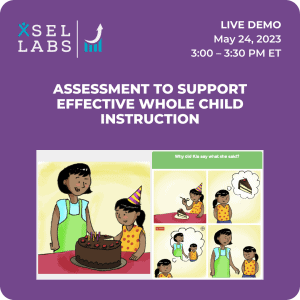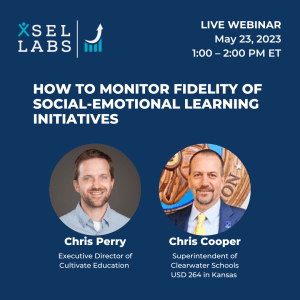This post is an honor of International SEL Day on March 27, 2020. Learn more and sign up to showcase, promote, advocate for and support SEL in your community today! Share with your social media networks using the #SELday and #SEL hashtags.
Social and emotional learning, or SEL, includes a set of competencies we need to be successful students, adults, workers, and citizens. These are the competencies we use to interact effectively with others, to form and deepen relationships, and to collaborate constructively with others. It includes things like empathy, emotion management, conflict resolution skills, and the like. These are competencies that, much like reading and math, can be taught and learned.
Throughout human history, SEL has been important. Our ability to work together is the foundation of civilization, and everything we’ve accomplished has been built in part on our social and emotional competencies and the collective efforts they make possible. Because teamwork is so highly valued, those who’ve had a social and emotional edge have always had the proverbial wind at their backs. There are six reasons why SEL is more important now than it has ever been, and because of that, we need to get it right.
Imperative 1: Today’s Problems Require Team Efforts
Every era faces big challenges, and in every era, people think they are living in the most difficult times in human history. Today, that presumption may be correct. The challenges are enormous—climate change, pandemics, economic disruption, social and political unrest. There’s an extensive list of enormous challenges in front of us. To prevail in our efforts to face these challenges requires a high level of sustained cooperation and teamwork—akin to what it took to send astronauts to the moon with 1960s technology. To get it right, we need to manage our emotions, understand each other across lines of diversity, resolve conflict, and work together like never before. SEL is foundational to the kind of cooperation and teamwork we need to succeed in facing today’s tough challenges.
Imperative 2: The Capacity for Human Connection is at a Premium
It’s a digital world, and children who grow up as “digital natives” are coming of age. Technology has changed so rapidly that no one can say for certain what the impact—good and bad—of intense and sustained digital interactions has been and will continue to be on people. One thing that seems clear, however: the ability to interact effectively with others, and to make and deepen relationships, unmediated by technology, remains essential. It is the foundation of effective leadership and productive teamwork (see Imperative 1, above). This is why employers increasingly prioritize “people skills” in hiring. This is why schools increasingly recognize the importance of social and emotional competencies to success in school and life. Greater digital immersion has placed a premium on those who know how to connect with others authentically and deeply. In this, SEL is at the core.
Imperative 3: Civic Life Needs SEL
Wherever you are on the political spectrum, you’ll probably agree that things have gotten pretty divisive, both in the United States and abroad. The reasons for the decline in civility in the public square are many and complex, and there is certainly no simple way to bring us to a higher level of comity in our dealings with one another. However, SEL plays a role. Imagine how we would feel if our leaders demonstrated grace, kindness, and a spirit of cooperation and compromise, deep respect, even in the midst of strong disagreement. Imagine if our leaders brought coalitions of people from different background together instead of dividing them. What would the consequences be?
Of course, in a democratic society, there’s never a time when bitter divisions are not present, but it’s a worthwhile thought experiment to imagine what would happen if even in disagreement, those who’ve been elected to represent us were to find a way to seek and celebrate common ground—to respect and honor diversity—and in so doing, to craft policies that advance the good of the group. By their example, public leaders who lived with compassion and connection might invite a new and positive generation into public service. Until those in the public square learn to operate more civilly, and for a long time after, the onus is on educators and parents to help children learn how to govern themselves and their relationships with respect and care. Maybe, just maybe, we can equip them to restore civility to civic life.
Imperative 4: Tomorrow’s Workforce Needs Coders Who Care
Most of the jobs that will be available when our children come of age don’t exist today. If so, how do we prepare the workforce of tomorrow? After all, we don’t want to teach people a trade that won’t exist when they enter the workforce. It’s pretty clear that there are certain broad skillsets that will be highly valued in tomorrow’s economy. The ability to create digitally. For example, the ability to code and to understand and manage data, and the like will be highly valuable for the foreseeable future. At the same time, social and emotional competencies—the ability to manage our emotions, to understand others, to resolve conflict, to make good decisions, to collaborate and contribute to a team—all of these will be at a premium too. This echoes the needs of Imperative 1, but in this case, SEL is a key to workplace teamwork and success.
Imperative 5: Tomorrow’s Problems Require Team Efforts
What problems will tomorrow bring? Recent events have brought a stark fact of life into sharp relief: We can’t know all the challenges that will confront us. The only thing that is certain is that there will be challenges, and they will be big, difficult, and incredibly consequential. As is the case for confronting today’s challenges, tomorrow’s challenges will likely test the limits of human ingenuity. To prevail in confronting tomorrow’s problems will require an ability to come together and coordinate our efforts, our contributions, and our insights in ways that we have never been called on to do before. That’s a big ask, and there’s a lot to it. But it is certain that the more we’re equipped to come together productively, the better our odds of success.
Imperative 6: To Succeed, We Need to Bridge Differences
A through line of human history is the struggle between “us” and “them.” Who is “us” and who is “them” changes, but the contours of the struggle remain roughly the same: Groups of people are defined and lines are drawn; people prefer ingroup members and deride outgroup members; ongoing struggles for dominance between groups lead to inequalities, prejudices, and ongoing hostilities. At the same time, in a highly mobile and interconnected world, people from widely different backgrounds are increasingly living in the same communities and working together. One thing seems certain: our potential to succeed in the face of challenge is vastly greater if we face them together. And so, to get the most out of each other, and to be as successful as we can, requires us to knit our efforts together across lines of division that have been difficult to span. Doing so requires sustained effort and social and emotional skill.
Concluding Thoughts
I strongly suspect there are more than six reasons SEL is more important than ever. My fervent hope for this, the first ever SEL Day, is that everyone will take a moment out of their day and consider the relevance of SEL to their own lives—to their successes and their failures—and to the communities we live in. Because in the end, though it may sometimes seem so, SEL is not an abstraction—it is the raw material we need as a species to succeed.
Related Blog Post: https://xsel-labs.com/blog/sel-in-an-unplanned-home-school-setting/
For more information about xSEL Labs and our services, visit our website : www.xsel-labs.com
For information on related Webinars, follow us on Twitter: @xSEL_Labs




